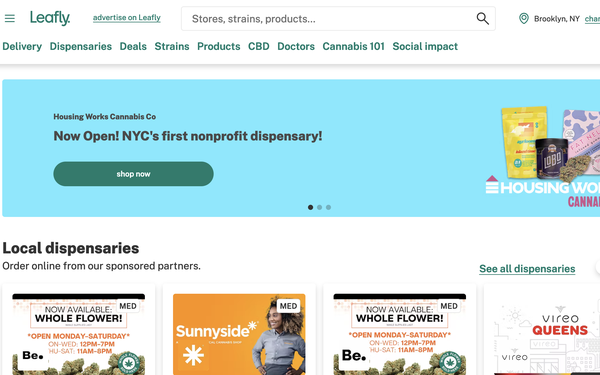
As consumers trade down and
increasingly look for deals in the cannabis space, online marketplace Leafly is doubling down on personalization and mobile ordering to better serve its brand and retail partners.
Launched in
2010 as a cannabis content library, Leafly derives revenue from more than 5,500 retailers and more than 9,000 cannabis and cannabis-related brands that pay for inclusion on the company’s website
and mobile app.
While retailer revenue rose 9.3% to $36.7 million in 2022 and income from brands was up 12.9% to $10.6 million, price deflation is a major concern—particularly for
brands.
“Cannabis prices are down, economics are difficult,” Leafly CEO Yoko Miyashita said on a Q4 earnings call last week.
That dynamic was evident in the fourth quarter,
when retailer revenue increased 4% year over year, but brand contribution declined by 12% “reflecting the softening we started to see in the second half of last year,” said CFO Suresh
Krishnaswamy.
advertisement
advertisement
Among other new features, having given shoppers the ability to make product price comparisons helped lure more than one million new users to Leafly’s mobile platform last
year—up 18.5%.
This year the company will offer more user personalization, effects-based search for cannabis users, and an increased focus on deals for price-conscious shoppers perusing
more than 160,000 products.
“We're building off our proprietary data to drive better personalization, creation and effects-based shopping, which allows consumers to shop based on how
they want to feel,” said Miyashita.
“Mobile is where our most engaged customers are. They search more, they shop more and we have an easier path to retention and
engagement.”
The company’s founding as a content library—now containing more than 11,000 cannabis-related articles and 1.3 million consumer reviews—has given it an
edge.
“Leafly's decade-plus history of producing cannabis-related educational content has given it an online search advantage in most markets in the U.S.—especially on the East
Coast where many markets are transitioning to adult use over the next several years,” investment firm TD Cowen noted in a post-earnings analysis.
“Cannabis—with all of its
regulatory hurdles and starts and pauses—is a long game,” Miyashita said last week.
“We're going to see for the first time how cannabis performs in a down economy and what we
see gives us reasons for optimism. We're adjusting to give consumers what they're looking for—value and providing retailer and brand clients with clearer and simpler paths to reach
shoppers.”